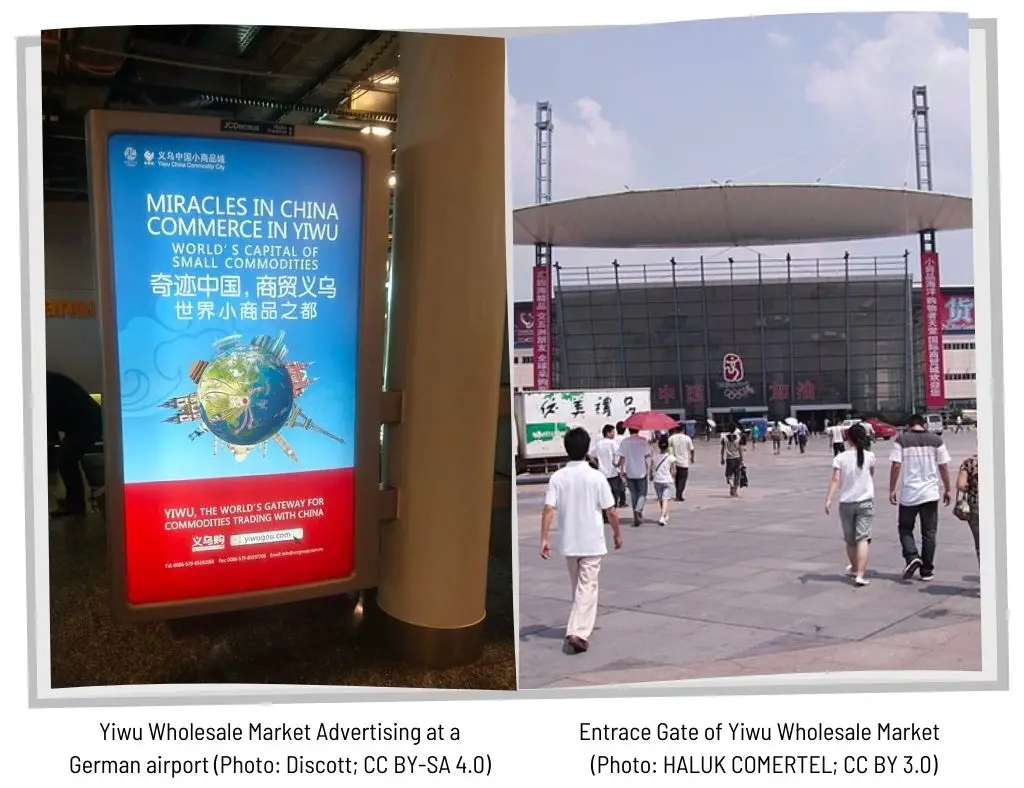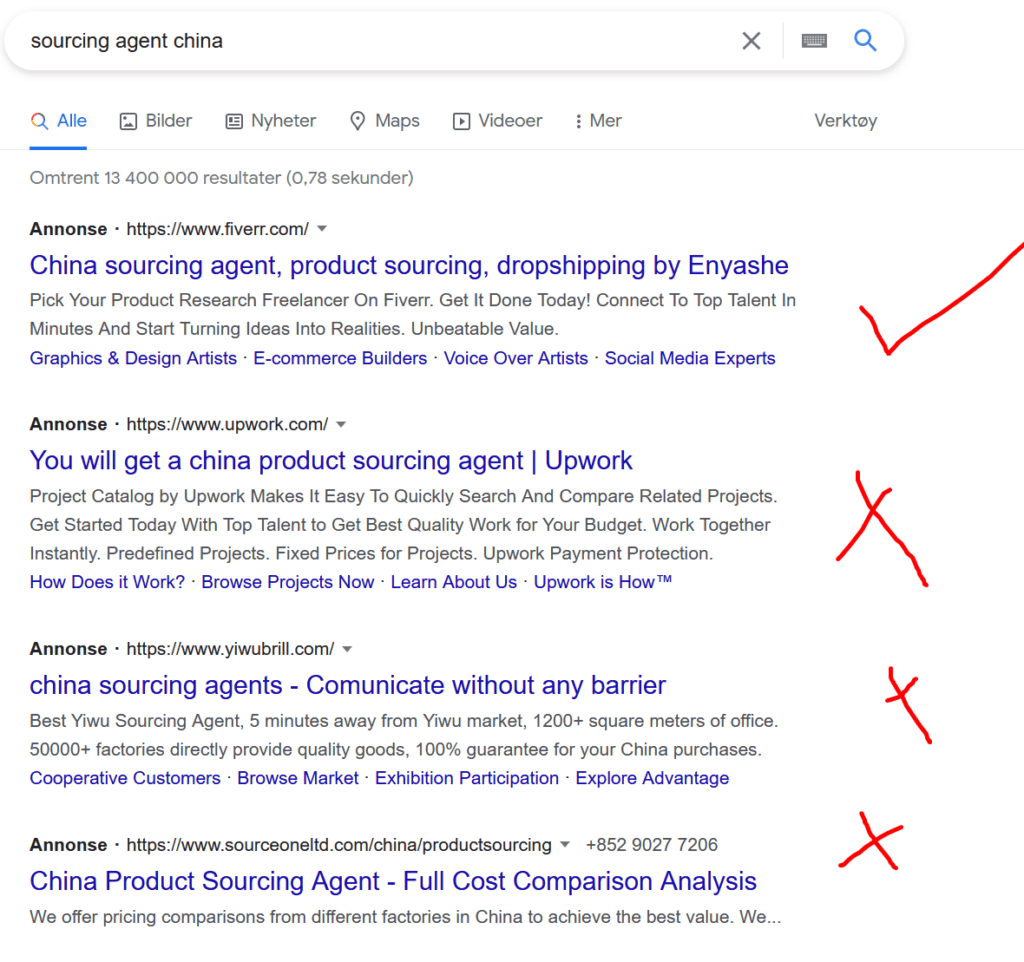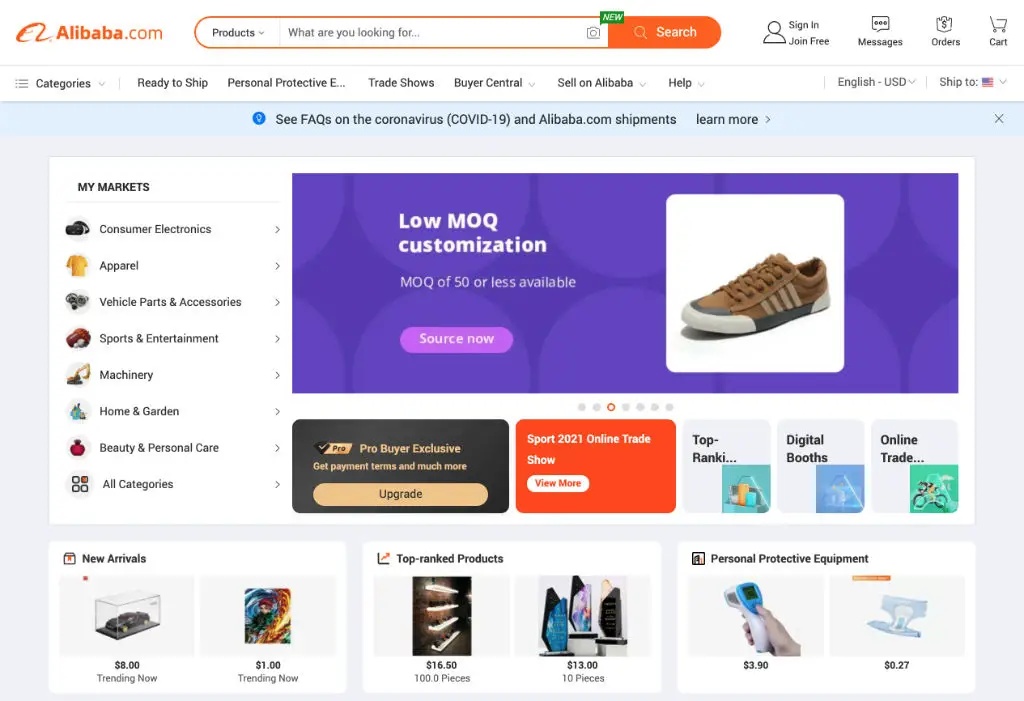I’ve personally been involved in sourcing products from China for more than a decade.
If you are a business owner looking for high-quality (or cheap) products from China, you have a mountain to climb. Believe me: I know. It’s time-consuming and can put your whole business at risk.
Because I don’t want you to make the same beginner mistakes many people make, I will walk you through the three options of product sourcing in this article. I explain which routes to go, and which not, and will give you valuable tips for negotiating with Chinese suppliers.
And yes: it will teach you the hard truth about sourcing high-quality products from China. Are you prepared?

Table of Contents
- Three types of product sourcing in China
- Option 1: Going to China to source products yourself
- Option 2: Finding a reliable sourcing agent
- Option 3: Source products from Alibaba
- Why is it so important to find a high-quality manufacturer in China?
- Best tips on negotiating with Chinese product suppliers
- The verdict: What is the best way to source high-quality products from China?
My experiences sourcing products from China
When some business owner tells me that “I bought these Chinese products, they seemed OK online. But when I got them, they were all wrong.”, I’m not surprised. Not surprised at all.
I once was in the same shoes. Here’s my experience:
- I’ve personally bought, shipped, analyzed and researched more than a thousand products from China that have been sold in the US and Europe.
- I spent five years living and working in China, a lot of the time working hands-on with Chinese manufacturers.
- I’ve made all the mistakes that you probably have done in the past.
I hate seeing honest business owners failing because of cheating suppliers (and sometimes because of their own greenness) – so I’ve created this guide.
Three types of product sourcing in China
First: let me briefly explain the three methods that I will present you within this article.
- Going to China to source products yourself: High cost, but low risk.
- Use a source agent (or agency) that you can trust: Medium cost and medium risk.
- Find some random supplier on Alibaba to source the product for you: Low cost and a risk so high that I don’t think you understand what you’re doing.
Now: I don’t say that you should never use Alibaba. But if you do: please know what you’re doing. The chances of being scammed or buying low-quality products is extremely high on the Chinese marketplace.
Let’s go into detail and analyze the three sourcing types:

Option 1: Going to China to source products yourself
Going to China to meet the different suppliers is the absolute best way to make sure that you will get a nice and smooth deal.
Many people hate me giving this advice – simply because going to China can be a hassle. But if I am being completely honest, I would say that your chances of success will increase by a lot if you’re willing to take a flight to China.
Hop on a flight, take the train to Yiwu Market and discover a large city full of suppliers and manufacturers that will cater your needs.
You need to only connect with people in China who know what they are doing, understand your language properly (as log as you don’t speak perfect Chinese), and can be trusted. Without being there in person, that’s almost impossible.
Visit the world’s largest wholesale marketing in Yiwu, China, in this video:
When should you NOT go to China and talk to suppliers yourself?
It also comes down to your ambitions. Are you a college student looking to import some “cheap stuff” that you will “flip on Amazon FBA for a small profit”? Then, don’t go to China. That probably doesn’t fit your budget.
So, let’s say that you don’t have any plans to visit a factory in Yiwu, Beijing or Shanghai. What’s the second-best option?
In that case, you might very well use a sourcing agent or Alibaba. But to achieve this, you need to make sure that you know what you’re doing. I’ve seen business partners lose many thousand dollars because they found a sourcing agent online that they believed that they could trust.
One supplier ordered 1,000 chessboards to the US. What they received was 800 backgammon boards.
Pros & Cons of traveling to China for business
Why should you go to China or not?
Pros
In Chinese business culture, meeting people face-to-face and have a drink & dinner together is often crucial for a good and long-lasting business relationship. That’s a fact. One great tip is to take your potential supplier out for a nice dinner in China to show gratitude. Believe me: they will be very impressed.
Prices online or through an agent are usually 20-30 % higher compared to what you can negotiate with them on trade shows in China.
Going around looking at products in for instance Yiwu Market is a great way to explore new products that you can sell online.

Cons
Traveling to China is a hassle for most of us. I have probably traveled in and out of China at least 20 times in my life. The visa stuff can be frustrating and take a lot of time.
The travel cost can be high. Flight tickets to China from Europe or the US are not cheap. Hotels in Shanghai/Beijing are not exactly cheap. And I can almost guarantee you that you will be scammed by the taxi driver in the airport as well.
Time. Going online, finding a couple of good products, and sending two e-mails will take you an hour. Buying an airplane ticket, getting your visa, spending a week in China and negotiate with loads of suppliers…it is extremely time-consuming.
Option 2: Finding a reliable sourcing agent
When you go to Google and type in sourcing agent china”, about a million websites will pop up.

From my experience, most of them will lead you to companies that don’t take your job seriously. Let me explain why.
Most of these “sourcing agents” are not agents at all. They will not work for you. These “agents” are people with financial interests in one or more factories that will, regardless of the product you want to source, lead you to this factory.
And that’s where you suddenly start to get in trouble.
How to distinguish a good and a bad sourcing agent in China?
It’s very hard.
However, one method has worked for me quite a lot. Contact 4-5 different agents and ask them about their customer recommendations. Ask for direct contact with European or American companies that have worked successfully with that specific agent.
From my experience, about 90% of all agents are reluctant to “give away customer information”. That should be a big warning sign.
Most sourcing agents are, in my experience, very little knowledgeable about the whole market. There are companies out there that claim that they can “source whatever product you need to find in China”. That is not true.
I have personally mostly been involved in apparel and fashion. If any Western company came to me and offered me a lot of money to source an electronic product for them; I would decline.
You must have a sourcing agent that understands the product that you are trying to source. So, ideally track down someone who is specialized in a specific industry and has the references to prove that.
Pros & Cons of using a sourcing agent
Why should you use a sourcing agent or not?
Pros
Most reliable sourcing agents in China have great contacts in their space. That means that you won’t have to spend a lot of time negotiating with different suppliers to get the product you want or the prices you want. Handy.
The best sourcing agents will also immediately understand the need of your customers. That is why I will very often recommend that you find a China sourcing agent who got experience in understanding what the American/European customer demand. “Quality” is a word that is interpreted quite differently among Chinese and Western customers, to say at least.
You work less in so many aspects. Finding a good sourcing agent is literally like putting logistics, warehouse issues, production, quality issues, sourcing, etc. in other peoples’ hands. It frees up a lot of time that you can use to grow your business.
Sourcing agents often have an efficient way to do the sample quality check before the products are shipped from China to your country. That is a massive benefit. You no longer must be afraid that your products come in the wrong color or with scratches all over them.
Cons
You will never have direct communication with the manufacturer. If you want to do some small changes in your product, you will always have to deal with the sourcing agent. That will often cause a lot of delay.
Most sourcing agents aren’t concerned about your business at all. Moreover, they usually have hundreds of customers that they do the same job for.
You are dependent on the sourcing agent in the future. If you have a stock issue and find out that your agent is on a 3-week holiday – what do you do? You cannot do much.
The problem is that most sourcing agents are very reluctant to tell you what factory they are working with. That means that you will be 100 % dependent on your sourcing agent from the day you hire him/her until the day you decide to go for a different factory. Scary.
You will pay more for your products. When I lived in China, I had many friends who were sourcing agents for Western clients. Let me put it this way: they were not exactly poor.
Option 3: Source products from Alibaba
Where is the first place people go when they want to source products from China? Alibaba.

The large marketplace website has been the go-to place for Western business owners for more than a decade. And that has happened for several reasons:
- The website is in English.
- You can communicate with the product supplier in English.
- Most of the products that have been produced in the world can be found on Alibaba.
However, there is one big problem. Only about 30-40% of the people listed as manufacturers are in fact manufacturers. The remaining 60-70% are resellers or middle men willing to take a cut of your sale. That would increase your product cost quite a lot.
Alibaba alternatives: Are they worth exploring?
In my opinion: no.
I see several websites advice people to go on local Chinese supplier platforms. In my experience, that is not a good idea.
I’ve tried several of these Alibaba alternatives. Even though I can read and speak Chinese, I struggle to see why you would go on such a platform. Not only do fewer suppliers speak English. They are not at all on a pure native Chinese platform to find Western companies to collaborate with.
If you want to look into alternatives: the Alibaba alternatives that most Western companies use are Made-in-China.com (apparel) and Chinavasion.com (electronics).
Pros & Cons of sourcing Chinese products online
Why is sourcing products on online platforms an good idea, and why not?
Pros
It is easy. Clicking your way to Alibaba.com and shop around is as easy as it gets. By searching for “t-shirt” on Alibaba, you instantly get access to nearly a million different manufacturers and agents.
Every serious manufacturer in China uses the Internet to connect with new business partners.
Cons
Understanding the quality of the items is a problem. To my experience, what you see is NOT what you get.
Many Chinese people know that companies in the West have a lot of money. Therefore, Alibaba and Made in China are two platforms that attract many scammers. To understand the different scams that you can experience on Alibaba.com, I strongly recommend this article from fba.help.
Middle men will very often get in the way of having direct contact with the manufacturer. This causes two problems. First, the price will increase as the middleman never works free.
Secondly, you can experience trouble in the communication. For instance, I once saw a company in the US receiving blue t-shirts instead of green t-shirts, simply because the middleman didn’t understand the English words for “green” and “blue”. He mixed up.
Why is it so important to find a high-quality manufacturer in China?
Your manufacturer will control your whole business; everything relating to the product is in the hands of your supplier. For example:
- Product raw material cost
- Product quality
- Packaging
- Shipping
- Communication
A bad manufacturer will be able to break your business in no time. You have to find a good Chinese supplier that is reliable and can deliver your products exactly when you need them.
In my experience, that is extremely hard.
Read this article if you want to find out more about how to find eco-friendly manufactures in China.
Best tips on negotiating with Chinese product suppliers
As I previously mentioned: I’ve done more than 100 successful deals with Chinese manufacturers.
They are tough to negotiate with. Here are some of my best tips to become successful:
Don’t talk about price at the beginning.
Many people go to Alibaba looking for a backgammon set for less than 5 USD. That’s the wrong way to start. First, you have to find a reliable manufacturer that has a long history of delivering QUALITY products, not cheap products. After you’ve found a good supplier who can deliver quality, and established some kind of relationship, Chinese businesses are always willing to negotiate price in the end.
Ask for a cheap test order.
Most of the professional suppliers already have a wide range of products they ship to the US or Europe. Ask them for a quick and cheap order to check their quality and shipping connections. If they are either slow to ship out or send you a low-quality product: stay away.
Try to present your business as bigger than it is.
Chinese suppliers are obviously very interested in companies that will order loads of products from them. It doesn’t matter if you’re a 20-year-old trying to make $2,000 extra pocket money through Amazon FBA. You should still tell them that you have a long history of selling products online, and that you have considerable plans to expand your business.
Tell them that you previously had bad experiences with Chinese suppliers.
Go on about a rant about how your previous supplier “could never deliver the quality nor quantity they promised”. And make it clear that you are now looking for a “trustable manufacturer that will take the business relationship professionally”. If your new supplier gets cold feet by listening to that type of words: stay away.
Video: How to negotiate with Chinese suppliers
To be honest, 99 % of all the “Chinese supplier” Youtube videos are b***s***.
The one below is not. It contains a lot of helpful tips on how to negotiate a better price with your Chinese supplier through Alibaba (or face-to-face).
The verdict: What is the best way to source high-quality products from China?
Go there and see for yourself. Meeting with the suppliers, feeling the products in your hand and negotiating face-to-face is the most effective way. If you don’t have a budget to go to China: the second-best option is to hire a local and trustworthy source agent.



Fantastic overview of the different sourcing types in China. Cheers mate
Thank you so much! Did you happen to use a lot of Scandinavian sourcing agents because your nationality is Norwegian?
Or did you just go with whatever you thought the American consumer would prefer?
We are a company that want to sell poker chips on Amazon, but haven’t figured out what type of sourcing we should do yet.
Hi Brad. I understand your struggle.
To answer your question first: no, I did not use any sourcing agents. I know a couple of Swedish and Danish guy doing sourcing in China for the Scandinavian market. However, I usually sourced products myself when I was in China. After a while, it wasn’t that hard. But I still remember my early days when I had no idea what I was doing.